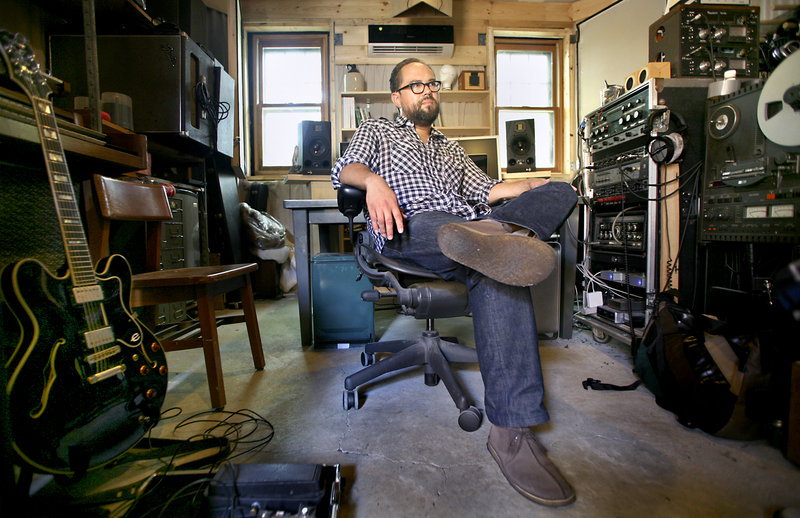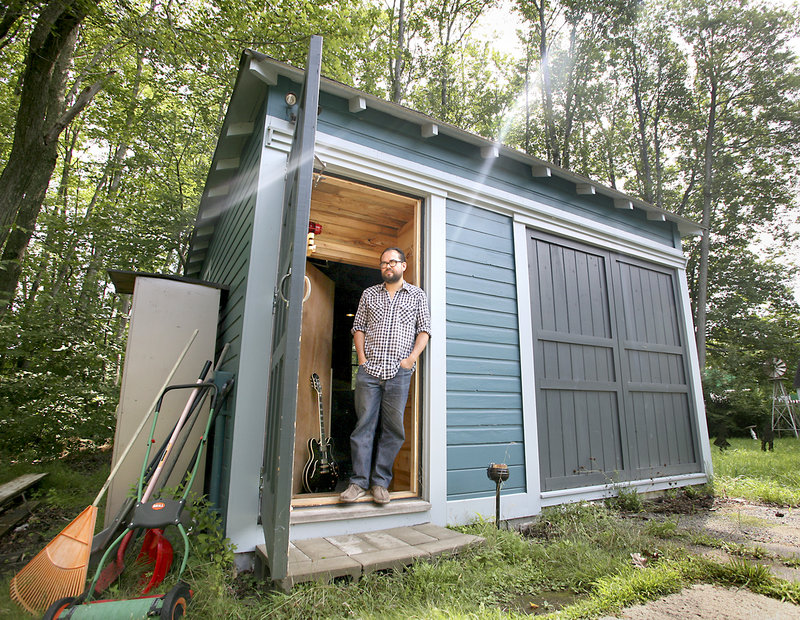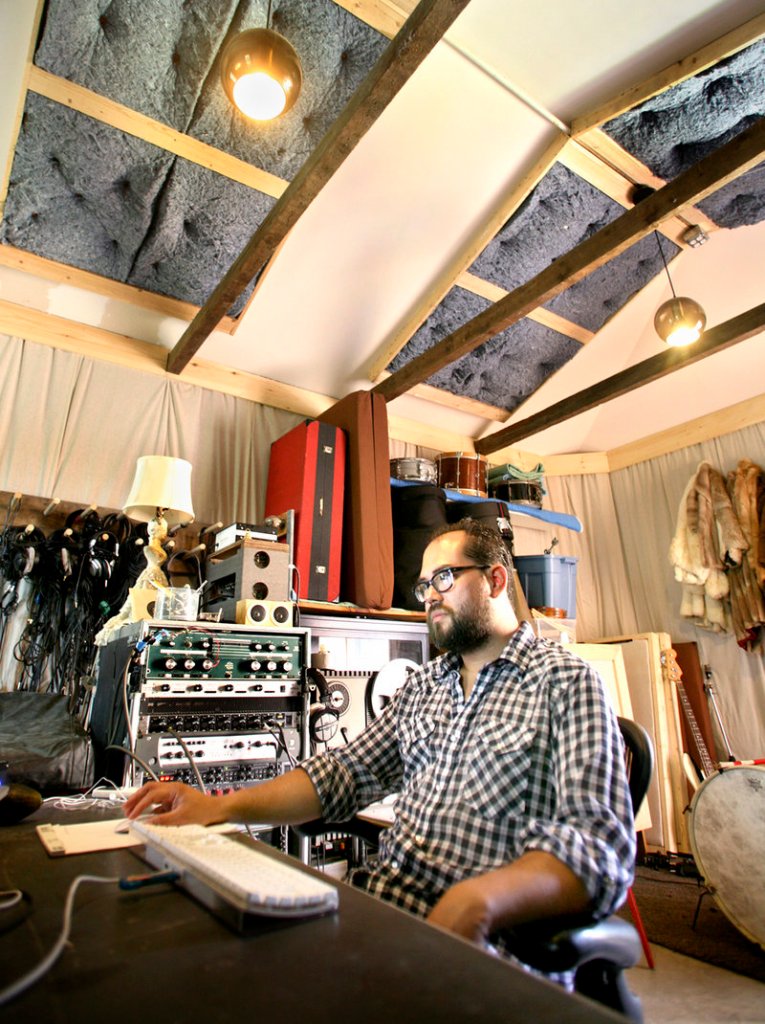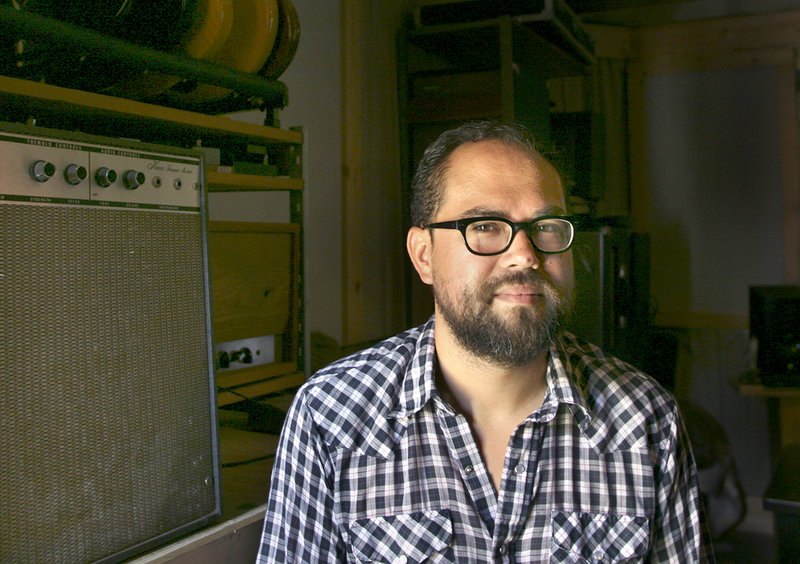SOUTH PORTLAND – Ron Harrity grew up on punk rock. As a teenager in Kansas City, he consumed punk like candy. He loved The Dead Kennedys and most of the bands on the underground SST and Dischord labels — The Minutemen, fIREHOSE, Minor Threat and all the others.
The sound of those records made an impact on him, because it seemed to reflect the ethics of the musicians: Unadorned, raw and passionate.
Like a lot of teens, he learned his way around the guitar and went about the business of playing in bands.
Fast forward 20 years or so. The course of Harrity’s life took him from coast to coast, from art school in Maryland to a job in Oakland, Calif. In the early 2000s, he came to Portland to work as a graphic designer. He played music on the side and logged long hours as an apprentice and studio assistant, which mostly meant getting coffee for the engineer, at least at the beginning.
When his band, Harpswell Sound, decided it was time to make a record, Harrity stepped up with his buddy Steve Drown at The Studio in Portland and tackled recording duties. The result was the EP “Port,” released in December 2003.
“Port” may not go down in the annals of rock history as an important record, but it does stand as the answer to a piece of Portland rock trivia. It’s the first album released on Peapod Recordings, the independent record label that Harrity founded and now runs from the garage of his home in South Portland.
In the years since, Harrity and Peapod have released 38 albums, and up to another half-dozen are queued up for release by year’s end.
Drawing inspiration from the DIY/punk attitude that he grew up on, Harrity’s Peapod Recordings fills an important niche in the Portland music scene. He gives bands the chance to make a record, and knows enough about the technical side of the process that those records always sound professional. He’s also a designer and promoter, so he can help bands make their records look good and get their music out to a wider audience.
“It’s more about cheerleading and helping wherever I can,” Harrity says. “I have a day job. I do this for fun. It’s not a money-making enterprise. I do it because I love the music and I love the community.”
‘PORTLAND WON OUT’
Harrity, 38, has lived in the Portland area since 2001. He moved here from California. He studied painting and photography at the Maryland Institute College of Art and wanted to get back to the East Coast, but wasn’t interested in Baltimore. A friend who taught at Bates College suggested Portland.
“I did an East Coast tour. I went to Providence, North Adams and Portland, and Portland won out,” Harrity said. “It seemed like it had an arts scene, a music scene. I liked Videoport, Bull Moose. I was impressed with Enterprise Records. Portland had one of everything I needed.”
In the decade since, Harrity has become a player on the local arts scene. In addition to his work with Peapod, he also helped establish the Picnic Music + Arts Festival, now in its fourth year and set for Aug. 27 at Lincoln Park in Portland. He is less involved now that the festival is established, but he got it going, and modeled it after a similar music and arts festival that he attended elsewhere.
Similarly, he booked the bands, DJs and a projectionist for the recent Hot August Night on a Boat party barge. Bands on a boat on Casco Bay is not a unique idea. But hiring edgy, indie bands for a boat cruise pushes the envelope.
Harrity booked a bunch of bands he knows and likes, some Peapod bands, some not — Metal Feathers, Mango Floss, Huak, Foam Castles, if and it — and sold out the cruise on a Sunday night.
Being active in the community is important to him, because it makes living here rewarding. He loves Portland, and loves giving back.
“I’ve never lived anywhere where I feel the scene is as supportive as it is here,” he said. “In Maine, people like doing their own thing and not hassling everyone. They do their own thing in their own quiet way, but there’s a great sense of community and support. Bands help each other out all the time.”
Harrity preaches to the bands he works with the importance of keeping it local. A lot of bands come to him hoping to conquer the world with their record. He tries to talk them out of that idea.
“I think it’s more important than ever to concentrate locally,” he tells them. “Don’t discount the importance of your local base. It’s a big deal to have however-many-hundreds of fans.”
Harrity’s work at Peapod embodies that notion. Brown Bird is Peapod’s most successful band. Its 2009 release, “The Devil Dancing,” is the label’s best seller, with 2,500 in sales. “But that’s not why I do it,” Harrity says, discounting the importance of the sales figures.
The important thing, he says, is that the Rhode Island band has grown to the point that it can support itself with its music, and Peapod was instrumental in that growth. Brown Bird tours regionally, and now has outgrown Harrity’s tiny label. That’s all good — for him and for the band.
It’s not about cashing in as much as it about supporting a band and enabling that band to stay active, he said.
TINY SPACE, BIG SOUNDS
The center of Peapod’s universe is a small garage behind Harrity’s house in South Portland. He calls it Forest City Studio, because the back of the garage abuts Forest City Cemetery.
It’s a small space — maybe 16 feet by 22 feet. Somehow, bands cram themselves in there to make records. Harrity’s a bit of a gearhead, and he’s got amps, guitars, keyboards, drum kits, racks of mikes and pedals neatly organized to maximize space. He designed the studio as a naval engineer might design the cabin of a sailboat: a place for everything, and everything in its place.
Harrity converted the garage a couple of years ago, and made it fully soundproof so he can work late into the night without disturbing his neighbors. If you didn’t know, you would have no clue the garage houses a recording studio.
It’s a fun place to work, despite the size constraints, said Chriss Sutherland, who has worked with Harrity as a solo artist and with the band Olas.
“The new space sounds great. It’s simple. What you see is what you get,” Sutherland says. “Olas is eight people, so it was interesting. We had to do most of it sectionally, but we did two tracks with the full band.
“Ron has the ability to handle whatever comes his way. We had eight people in there and a baby, and with Ron it was nine. He did not get freaked out at all.”
Sutherland calls Harrity “geeky and tech-savvy, but not too much. He doesn’t sit there and gab your ear off about his gear. But he knows how to run his equipment, and he’s remarkably efficient. He is amazingly patient but very engaged. He is not just sitting there waiting for you to get done. He in engaged and affected by what you do. He gets encouraged when you get encouraged.”
Evan Parker, a member of the post-folk indie-rock band if and it, appreciates Harrity’s laid-back approach and his ability to listen. If and it is making a record with Harrity now, and aims for a fall release.
“He has a really good ear, and he’s easy to work with, an easy guy to be around,” Parker says. “He doesn’t hinder the creative process at all.”
For Harrity, it all comes back to the lessons he learned as a teenager in Kansas City. His first exposure to music that changed his life came from bands that were on record labels that had a unique sound — SST, Dischord, Touch and Go and others.
He wants Peapod bands to have their own unique sound, indicative of the atmosphere he cultivates at Forest City Studio — raw and unadorned and completely honest.
Staff Writer Bob Keyes can be contacted at 791-6457 or at:
bkeyes@pressherald.com
Follow him on Twitter at:
twitter.com/pphbkeyes
Send questions/comments to the editors.






